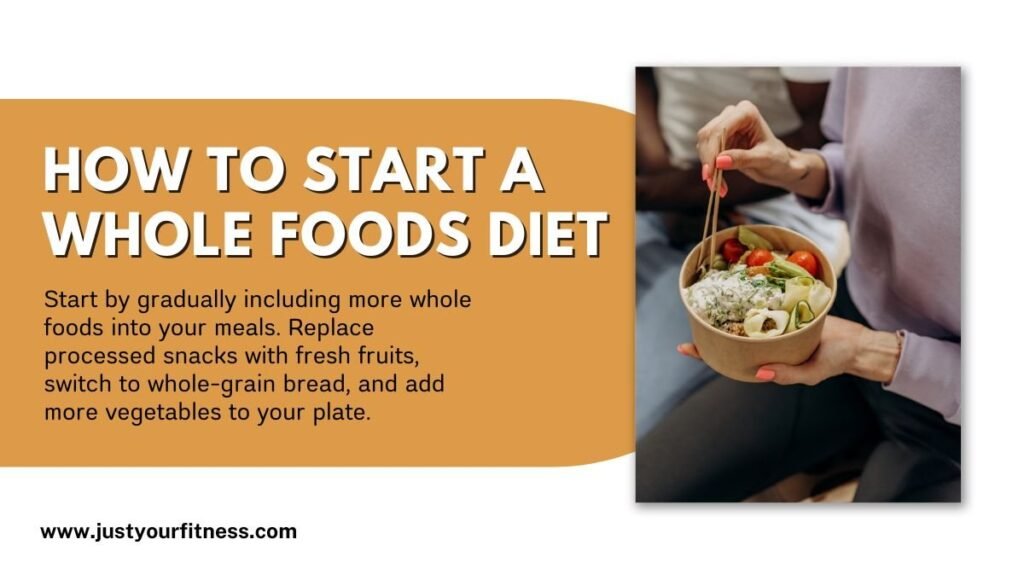Introduction
Are you eating processed food and trying to make natural changes to your well-being? The answer is whole-food diets! Whole foods are low-processed; they have not experienced many physical or chemical changes before use. These foods contain elements that support the proper functioning of all systems in the human body. However, In this article, you will learn more about the whole-food diet benefits and discover how it can be magical to your life. Let’s dive in!
What is a Whole Foods Diet?

Some background information is first must to understand the benefits of the whole-food diet. A whole-food diet is based on eating foods in their natural form. It means fruits, vegetables, grains, nuts, seeds, and beans. Reducing the intake of processed foods and additives is a strategy that helps promote whole foods.
Fundamental Details of a Whole Foods Diet
- Fresh Fruits and Vegetables: Rich in vitamins and minerals and contains natural antioxidants.
- Whole Grains: For example, brown rice, oatmeal, and quinoa.
- Nuts and Seeds: Good source of healthy fats and protein.
- Legumes: Beans, lentils, and peas are rich in fiber and simple nutrients.
The Top Whole-Food Diet Benefits

Boosts Weight Loss Naturally
Still, the most outstanding whole-food diet benefits are natural and effortless weight loss. Natural foods are nutrient-rich and usually contain fewer calories than processed foods. However, they make you eat longer without having to snack on unhealthy foods or consume many calories. Therefore, the fiber in fruits, vegetables, and grains helps control weight without adopting extreme diets.
Enriches Digestive Health
Whole foods containing dietary fibre help ensure good digestive health. Fruits and vegetables rich in fiber help promote bowel movements and prevent the formation of wastes that cause constipation. Moreover, one benefit of a whole-food diet is that it decreases the risk of digestive diseases like this condition and IBS.
Boosts Energy Levels
Another great advantage of a whole-food diet is that it increases energy levels. The natural sugars and nutrients in whole foods help maintain energy levels and balance throughout the day. Whole foods supply energy in equal measures, in contrast to processed foods, which cause variation in the energy supply, resulting in alteration in blood sugar levels.
Supports Heart Health
Another benefit of a whole-food diet is that it can help improve heart health. Daily intake of fruits, vegetables, nuts, and whole grains reduces LDL cholesterol levels and improves blood pressure. Whole foods also contain antioxidants that help the heart and cardiovascular system.
Lowers the Danger of Chronic Diseases
Switching to a whole-food diet is a powerful way to reduce the risk of chronic diseases. Diets heavy in processed foods have been connected to diseases like diabetes, high blood pressure, and many types of cancer. Significantly, one of the benefits of the whole-food diet is that it reduces these risks by supplying your body with essential nutrients that help fight diseases.
Improves Skin Health
Numerous benefits come with the consumption of whole foods regarding skin-related issues. Not only does using foods with vitamins and antioxidants help in skin nutrition, preventing acne, but also enjoying young-looking skin. It is an extra benefit of eating a whole foods diet that should be taken in for good skin.
Supports the Immune System
Your immune system needs many nutrients to work correctly. Whole foods contain vitamins, minerals, and antioxidants, which supply these compounds to your body and help to enhance your immune system. Whole foods’ benefits include a boosted immune system that will help fight diseases and other infections.
Helps in Mental Clarity and Focus
Did you know your diet defines your ability to think clearly, meaning a balanced diet enhances your focus? However, The consumption of whole foods has a positive impact on the brain’s health. Another shocking impact of a whole foods diet is that it combats ‘brain fog,’ allowing the brains to operate at their best due to the provision of vital nutrients.
Supports Healthy Blood Sugar Levels
Therefore, keeping your blood sugar levels from rising becomes crucial if you are a diabetic or at risk. For example, fresh veggies, lentils, and whole grains have low glycemic reviews, which help maintain stable blood sugar levels. Although, The whole-food diet benefit plays a significant role in controlling and preventing diabetes.
Enables Healthy Eating Habits
Promoting healthy eating habits is one of the longest-lasting whole-food diet benefits. It comes out that paying attention to whole foods means you will need help to gorge on unhealthy processed foods and junk food.
How to Start a Whole-food Diet Benefits

Yet, There is no reason why changing to a whole-food diet has to be complicated. Start by gradually including more whole foods into your meals. Still, replace processed snacks with fresh fruits, switch to whole-grain bread, and add more vegetables to your plate. Small changes lead to significant benefits!
Tips to Successfully Whole-Food Diet Benefits
- Plan Your Meals: Prepare individual parts in advance so there is time for healthy food preparation.
- Read Labels Carefully: Minimize processed foods in your diet.
- Shop Smart: Stay out of supermarket centres, focusing on the outside row because whole foods are usually found there.
Misconceptions About Whole-Food Diet Benefits
Although the whole-food diet benefits, some aspects might be optimised. Some individuals reason that whole-food dieting is limited or costly. But this diet can be cheap and balanced if one takes time to shop, plan, and consider seasonal fruits and vegetables.
Conclusion
The advantages of a whole-food diet include lower calories, better digestion, heart health support, better energy levels, and many more. So, consuming whole foods means feeding your body right and laying the foundation for a better quality of life. Therefore, why not start today and experience the benefits of whole foods?
FAQs
Which foods should be included in a whole-food diet?
Fresh fruits and vegetables, whole grains, nuts, seeds, and lentils should be considered whole foods. These foods are healthy, rich in nutrients, and beneficial to the body in many ways.
Do the whole-food diet benefits work for everyone?
Indeed, the consumption of whole foods is safe for many individuals. However, those with particular issues regarding food consumption or diseases should consult a doctor before they make the change.
What about meat products? Can we use them in a whole-food diet benefits?
You can eat meat on a whole-food diet, but it should not be processed. Moreover, When buying ground beef, thin cuts and organic or grain-fed only.




